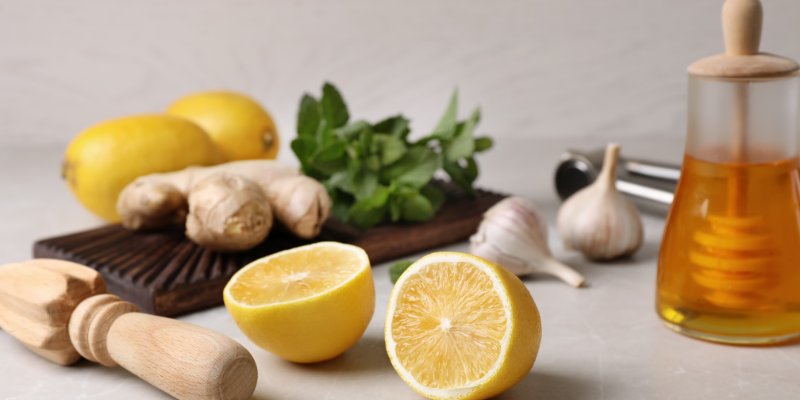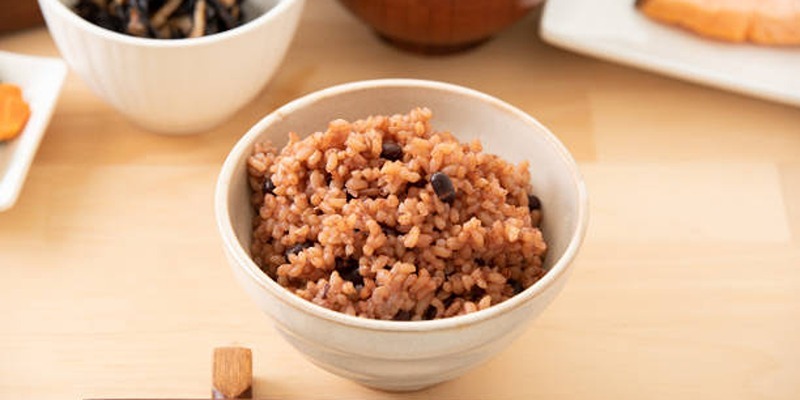Natural Solutions: 7 Home Remedies for Alleviating a Cough
Feb 04, 2024 By Madison Evans
Allergies, viruses, and irritants may cause persistent coughs. Coughs are commonly treated using age-old folk remedies. Seven excellent cough cures are examined in this article. These cures include honey, known for its antibacterial characteristics, and onion fumes, which provide surprising alleviation. Hot fluids like herbal teas and lemon water soothe the throat and hydrate the lungs, providing rapid relief. Ginger's healing properties and menthol's cooling effect provide cough alleviation. Traditional home treatments for persistent coughs are accessible and natural, demonstrating the wisdom of home-based health and well-being.

7 Home Remedies to Get Rid of a Cough:
Honey:
Bee is a good home medicine for coughs due to its inherent sweet and amber tint. Honey's calming qualities come from its antibacterial and antibacterial characteristics. Honey's antimicrobial qualities fight nasal germs, preventing conditions. It also soothes throat irritation with its anti-inflammatory qualities. Honey's phytonutrients boost the immune system and improve respiratory health beyond acute alleviation. This complex treatment soothes the throat and increases the body's defense. Honey is a tried-and-true cough treatment, added to warm drinks or eaten straight.
Honey's adaptability makes it creative and tasty as well as healing. Honey is delicious and easy to treat coughs, whether drizzled over toast, hot drinks, or herbal infusions. Honey's long history in home healthcare shows that natural remedies may improve respiratory health.
Cut Up an Onion to Relieve Your Cough:
Using an onion to relieve cough symptoms is unexpected due to its release of sulfur chemicals when chopped. Despite its unorthodox method, inhaling these vapors reduces throat discomfort and improves breathing. Antibacterial sulfur molecules may help onions treat respiratory ailments. Based on traditional knowledge, this ancient treatment shows how everyday kitchen items may have surprising medicinal advantages. Onions are a natural cough cure, whether added to soups, positioned near the bed, or chopped to release their fumes.
Onions are used for cough treatment due to the increased interest in natural and alternative medicine. This essential kitchen item proves the efficacy of traditional medicines, highlighting the need to try new approaches to prevalent health conditions.
Hot Fluids:
Drinking hot fluids, such as herbal teas, broths, or warm water with lemon, is a proven home cure for cough symptoms. These fluids soothe the throat and reduce inflammation immediately due to their warmth. Healing herbs like chamomile and peppermint are added to herbal teas. Sipping hot beverages offers comfort and maintains respiratory hydration, which aids natural healing. The steam from these heated fluids helps remove mucus and makes breathing easier. This simple, pleasant cough cure without drugs is popular due to its accessibility and comfort.
In addition to immediate comfort, hot drinks improve respiratory health. Warmth relaxes throat muscles, minimizing coughing. Whether as a soothing herbal infusion or a warm bowl of soup, hot fluids are a flexible and accessible natural cough remedy. This ancient practice shows the power of home cures.
Humidifier or Steamy Shower:
A humidifier or steamy shower might help alleviate cough symptoms by minimizing throat and airway dryness. Bedroom humidifiers provide moist air all night. Humidity calms inflamed respiratory passages and improves breathing. A hot shower is another quick technique to moisten the airways. The steam loosens mucous, relieves congestion, and calms coughing.
Steamy showers and humidifiers promote the body's natural healing processes beyond immediate alleviation. Moist air reduces throat dryness, making sleep more pleasant. To relieve coughing and emphasize the need for proper humidity levels for respiratory health, include these routines into one's routine. A humidifier or steamy shower follows the tradition of natural, effective home cures for common health conditions.

Ginger:
Ginger is a widespread cure for several diseases, including coughs, due to its strong taste and therapeutic benefits. Its anti-inflammatory and antioxidant properties make it a traditional medicine favorite. Ginger tea, a popular and easy way to consume this potent root, involves steeping fresh ginger slices in hot water. The respiratory system receives ginger's medicinal properties and tea's calming warmth. Ginger's antioxidant and anti-inflammatory qualities help respiratory health and soothe throat inflammation. Ginger's mild spiciness makes it a tasty and efficient natural treatment. Ginger, eaten as tea or in other dishes, is a delicious and adaptable cough remedy, proving the efficiency of natural substances in health practices.
Ginger supports holistic traditional medicine by treating symptoms and general well-being. It may be added to soups, infused into drinks, or cooked, making it easy to include in everyday life. Ginger has long been used to relieve respiratory discomfort, demonstrating the link between taste and health.
Hot Drinks:
Enjoying hot liquids, such as herbal teas or warm lemon water, is a proven method for relieving cough pain. The warmth in these drinks relaxes throat muscles and provides relaxation. Herbal teas and lemon water with relaxing herbs or vitamin C-rich citrus give respiratory relief beyond warmth. Herbal remedies like chamomile or eucalyptus offer pleasant temperature and respiratory health advantages. Sipping a hot drink relaxes and improves well-being beyond immediate comfort. This age-old method fits with the traditional use of warm beverages to treat coughs, demonstrating the ease and effectiveness of home-based respiratory health treatments.
Hot liquids are a comprehensive and comfortable self-care practice beyond their immediate effects. The variety of tastes and ingredients lets people customize their experience, making it relaxing and fun. The longevity of hot liquids as a cough cure shows the benefit of incorporating basic, natural practices into everyday routines to promote respiratory health.
Menthol:
Menthol, a component in cough drops and hot drinks, is a calming cure for chronic cough symptoms. Menthol soothes throat discomfort and suppresses coughing with its cooling feeling. This makes it popular among coughers who want rapid relief. Whether in tablets, teas, or vapor rubs, menthol's unique characteristics provide relief. The cold feeling numbs the throat, minimizing coughing and calming. This makes menthol a flexible and accessible alternative for natural cough relief without medicine.
Menthol follows the practice of using natural chemicals for respiratory comfort. Menthol's prevalence in cough drops and other medicines shows its timeless appeal as a pleasant and dependable home-based cough remedy.
Conclusion:
Accessible and varied home treatments may treat coughs, a normal reaction to many stimuli. These remedies offer a wide range of natural cough remedies, from the classic sweetness of honey to the surprising benefits of inhaling onion vapors, the comforting warmth of hot fluids, and the healing properties of ginger and menthol. Honey soothes throat discomfort due to its antibacterial and anti-inflammatory properties, while onion vapors do the same. Herbal teas and warm water with lemon soothe the throat and hydrate the lungs. Ginger's anti-inflammatory and antioxidant qualities and menthol's cooling effect improve respiratory health. Daily use of these medicines and rest and water helps the body recuperate. If cough symptoms intensify, visit a doctor for a balanced and knowledgeable home cough management plan.

The Pros and Cons of Adopting a Polyphasic Sleep Schedule

6 easy bowl recipes for a wholesome and nutritious dinner

Skin Tag Vs. Mole: Differences And Similarities

Unveiling the Hidden Benefits: Are Antidepressants Also Pain Relievers?

A Comprehensive Guide to Understanding Childhood Depression

Health Benefits and Techniques of Fermenting Brown Rice

Agoraphobia Explained: Causes, Symptoms, and Treatments


